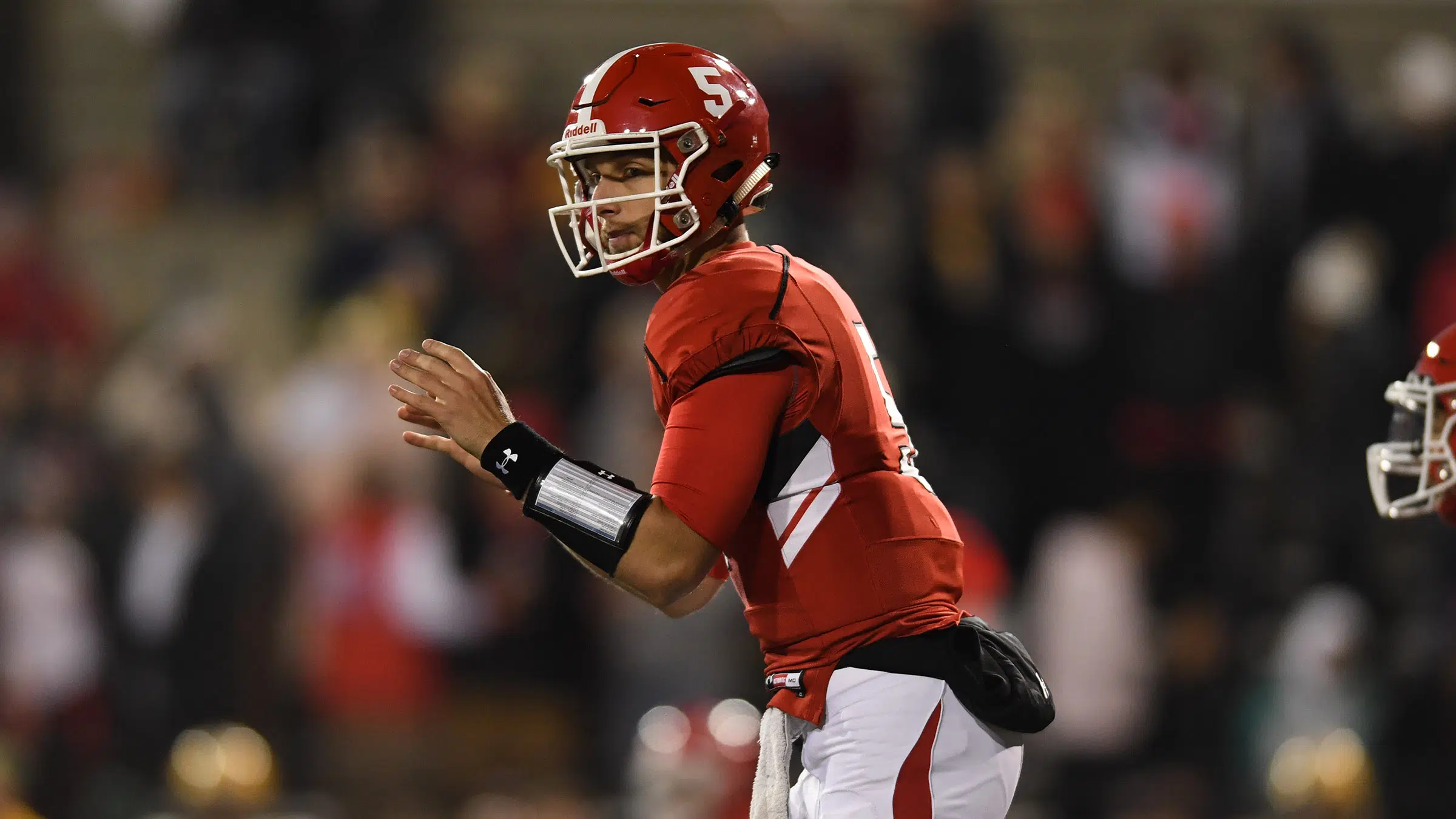Youngstown State was an elite FCS program in the 1990s and can be again, but the climb is long and steep from where they sit now, writes Keith Brake.
Picture a crisp, sunny December Saturday in the mountains of West Virginia in 1994. A crowd of more than 27,000 has gathered in Huntington, almost all of them clad in red after a four and a half hour trip from northeast Ohio to watch their beloved Youngstown State Penguins match up with Boise State, hoping to see the third national championship in program history.
The game isn’t particularly close. Jim Tressel, with barely a gray hair anywhere on his head, coaches his defense to as close to a perfect game as anyone could ask, notching two takeaways and allowing just 59 rushing yards. Shawn Patton reels off a 55 yard touchdown run with 7:16 left to put YSU up 28-7 (they ultimately win 28-14) and puts an exclamation point on YSU’s second-ever undefeated season and first since World War II. While the Penguins still had another championship to claim in 1997, the 14-0-1 campaign ending with a title in Huntington is, by many measures, the zenith of YSU football.
Nearly three decades later, the only thing YSU has in common with its peak is the uniform colors. In 2000, after an unceremonious first round loss to Richmond, Tressel was poached away by Ohio State, leading the Buckeyes to a BCS National Championship two years later. Since his departure as head coach, the Penguins have made the playoffs just twice: a run to the semifinals in 2006, and a Cinderella run to Frisco in 2016, where the Penguins lost to James Madison in Bo Pelini’s second year. The rest of Pelini’s tenure failed to build on that run, and the Penguins were relegated to the bottom half of the Missouri Valley Football Conference for three seasons before Pelini was hired away to be the defensive coordinator at LSU early in 2020.
Tressel, back at Youngstown State as the university’s president, has changed tack, going from a “name” head coach to Doug Phillips, who wasn’t in college football at all five years before getting the job. Phillips has had almost a year to work the program back from one of its lowest points in the last three decades, and while his players and staff are hungry and motivated, the climb is steep. Stambaugh Stadium hasn’t strained to fill its 20,630 seat capacity in years. YSU is playing from behind in recruiting against the numerous MAC schools in the region, and there is little starting experience returning to the roster from 2019. With good facilities, a wealth of tradition to recruit to, and plenty of people in important positions who hold a deep passion for football, Youngstown State has what it needs to be competitive in FCS again, but it’s going to take time.
Returning Starters
Offense: 3/11 (QB, LT, TE)
Defense: 5/11 (DT x2, CB x2, SS)
Special Teams: 3/3 (PK, P, LS)
Returning Statistical Leaders (2019 Stats)
Rushing: Braxton Chapman, Jr. (84 rushes, 404 yards, 5 touchdowns)
Passing: Joe Craycraft, Jr. (52.0% completion, 893 yards, 8 touchdowns, 3 interceptions)
Receiving: Samuel St. Surin, Sr. (16 catches, 246 yards, 1 touchdown)
Tackles: Zaire Jones, Sr. (35 solo, 60 total)
Sacks: DeMarko Craig, So. (5)
Interceptions: Zaire Jones, Sr. (3)
The Head Coach
After Bo Pelini stepped down to take the defensive coordinator position at LSU, the interregnum period at Youngstown State lasted just 11 days between the official announcement of his departure and the announcement of Cincinnati running backs coach Doug Phillips as the eighth head coach in program history. Phillips’ hiring is an excellent example of how relationships can pay dividends at unexpected times.
From 2008 to 2015, Phillips was out of coaching all together. He was a high school principal and superintendent with stops in Beloit and Canton, Ohio, and Dickson, Tennessee; by all indications, he was done coaching football after two seasons as defensive ends coach at Bowling Green and a season in a quality control role at Ohio State. His time at BGSU sowed the seeds of his return, however, when he worked alongside future Iowa State head coach Matt Campbell. Campbell persuaded Phillips to return to football as Iowa State’s director of player personnel in 2016, which caught the attention of former Ohio State colleague Luke Fickell when Fickell was hired at Cincinnati in 2017. Phillips joined Fickell’s UC staff as special teams coordinator and later as running backs coach. That position putting him back on the radar of people in the YSU community, including Tressel. Phillips was a graduate assistant under Tressel at YSU on the 1991 national championship team. Three decades later, Phillips’ coaching career has come full circle as he steps into the role Tressel once occupied when he built a powerhouse in northeast Ohio.
Offensive Personnel
One of the biggest issues over the last several years in Youngstown, even during the 2016 run to the national championship game, has been continuity at quarterback. Hunter Wells didn’t become the unquestioned starter in 2016 until late in the year, and the Penguins have started Wells, Nathan Mays, Ricky Davis, Montgomery VanGorder, and Joe Craycraft at varying points over the last three seasons. Craycraft, now a junior, could be viewed as the favorite for the job insofar as there is a favorite, but first team reps were split among three of the seven quarterbacks on the roster in the fall, with Craycraft, promising redshirt freshman Mark Waid, and sophomore Mitch Davidson all getting opportunities to strut their stuff. If Craycraft does indeed start, look for the staff to find creative ways for Waid, a gifted overall athlete, to get involved in the offense.
Whoever starts at quarterback will inherit an almost entirely new team compared to 2019. All three starting wide outs from a season ago graduated. Promising tight end Miles Joiner graduated early and entered the transfer portal; he’s now at Northern Illinois, leaving Josh Burgett, primarily used as a blocking tight end the last two years, as the most experienced player at that spot. Four new starters step into the offensive line, and over half the team’s rushing workload departs just with Joe Alessi and Nathan Mays. That said, there is good news.
For one, the starting quarterback will have a quality bodyguard in veteran left tackle Dan Becker. Entering his junior year, the Cincinnati product already has 21 starts at left tackle and was an All-Missouri Valley Football Conference Honorable Mention player in 2019 and a preseason all-conference selection this year. Becker is poised to take a big leap in 2021.
The other good news is, Doug Phillips and staff have also seen the lack of returning starters and pursued reinforcements via transfer. The offensive line has been addressed with a pair of additions in former Lehigh left guard Nick Rosen, who was a fixture on the Mountain Hawks’ line until an injury early in what would have been his senior year derailed him and granted him an extra season of eligibility. Butler Community College standout tackle James Morrow is also in the mix to shore up the line, but this is a unit with a lot to prove overall.
The staff likewise applied their philosophy around reinforcements to the wide receiver position, a unit without a true number one receiver to start the year. The closest they might get is Malick Mbodj. The Cincinnati transfer had more receiving yards at his old school (249) than any receiver returning from YSU’s 2019 team and has impressed in practice. Reinforcements might not just be external, either: the staff has experimented with moving Demetries “Dee” Ford, who started seven games at cornerback as a true freshman in 2019, to wide receiver, underscoring the lengths the team could go to for depth. Returning senior Samuel St. Surin was a standout in practice during the fall, and C.J. Charleston is an intriguing redshirt freshman who racked up a big day against Indiana State late in the 2019 season.
The Penguins didn’t have to look far for backfield help, adding Division II superstar Jaleel McLaughlin as a mid-year transfer from nearby Notre Dame College, just 69 miles from campus. McLaughlin led Division II in 2019 with an eye-popping 2,316 yards and 30 touchdowns on 345 carries in 14 games. He was a two-time finalist for the Harlon Hill Trophy, given to the top player in Division II, and transfers in as a junior. Big back Braxton Chapman (6’2″, 220 lbs) returns to the backfield looking to build on a season that started white hot but fizzled once conference play began. Christian Turner and London Pearson provide senior depth and can spell the other backs, especially with Turner’s pass catching ability out of the backfield.
To tie it all together, Phillips has tapped a veteran play-caller to be his offensive coordinator in Troy Rothenbuhler. The former Bowling Green OC has been all over the country at nearly every level of football, even getting a taste of the NFL in a support role on Steve Wilks’ ill-fated 2018 staff with the Arizona Cardinals. Scoring points wasn’t that much of a problem for YSU before – they finished second in the conference in points per game a season ago, behind only NDSU – and Rothenbuhler has some intriguing, if inexperienced, pieces to begin building the identity of the Penguins’ offense.
Defensive Personnel
YSU’s defense a season ago left a lot to be desired, allowing nearly 27 points per game and ranking 7th in both rushing defense and pass efficiency. But that pass defense could be in line for an immediate boost with three transfers joining the defensive backfield. Most notable is the addition of Isaac Steele, a Liberty transfer who opted out of the fall season due to COVID-19 concerns. The redshirt senior started 11 of 12 games for the Flames in 2018 before injuries disrupted his 2019 season. Steele could step in right away at free safety alongside returner Zaire Jones. Additional safety depth could come from Syracuse transfer Allen Stritzinger, who enrolled at YSU in the fall and could also line up as a nickel, and Florida transfer Quincy Lenton, whose career has been hampered by a number of injuries which limited his playing time prospects at Florida.
No transfers for the spring are in the cards at cornerback, and the group looks thin at first blush. Melvin Jackson, a junior, returns after starting a number of games and is the top player at the position, but outside of Jackson and potentially Dee Ford if his foray at receiver doesn’t work out, the position is wide open for anyone looking to seize playing time and could be fertile ground for a breakout candidate.
The biggest changes to the defensive setup in 2021 might come at linebacker. No full-year starters return from a season ago, but sophomore Griffin Hoak got opportunities late in 2019 to push for snaps and has shown promise under the new staff. One thing missing from previous groups of starting ‘backers at YSU has been length, something remedied by transfer reinforcements in the form of Cincinnati import Dorian Holloway (6’3″), who comes into the program as a redshirt sophomore and will push for playing time immediately.
On the defensive line, the key returning piece is DeMarko Craig, Jr., a sophomore with breakout potential after holding down a starting role for much of 2019 against older competition and notched five sacks. Junior Antoine Cook and sophomore Vinny Gentile will compete for playing time alongside him, but the literal big fish of the defensive line is Ty Eddington, a 6’3″, 325 pound defensive end who comes in from Eastern Michigan as a graduate transfer after starting sporadically over two seasons.
How this defense coalesces into a unit with so many parts pulled in from elsewhere will be a big test for young defensive coordinator Joe Schaefer. Though inexperienced, Schaefer’s abilities as a game planner and recruiter – particularly in the Cleveland area, a crucial spot for YSU – have shot him from Division III to FCS and presented him an opportunity to go from regionally reputed to rising star in the profession.
Spring 2021 Schedule
The Penguins will have no choice but to hit the ground running in this spring 2021 season with a front-loaded schedule that opens in the Fargodome on February 21st. Six days later, they will play host to Northern Iowa, then a Southern Illinois team with something to prove after being snubbed from the 2019 postseason, then a game in the tough mid-March cold of Brookings with a trip to South Dakota State. While the second half of the season is easy only by relation to the first half, home dates with South Dakota and North Dakota provide winnable games, then the Penguins close with Western Illinois and end the regular season with their first taste of Bobby Petrino’s Missouri State team with multiple additional games under its belt. The Penguins’ bye week comes at the end of the season, and it could well be an early start to the off-season for a team needing more than one season to get the pieces in place to return to the FCS playoffs.
















Comments